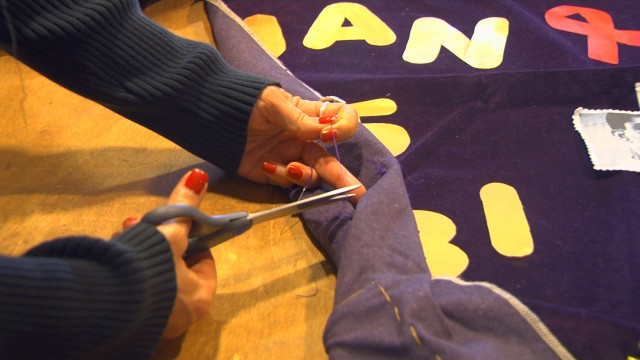It’s 2015, and it’s yet another World AIDS Day. Though we can trace HIV back for 34 years, there’s still not yet a cure. Right now, the best we have is the daily vaccine, PrEP, that all but prevents people engaged in risky (and not-so-risky) behavior from contracting the virus, but it still isn’t as easy or assured as, say, the HPV vaccines.
In America, HIV infections span communities of all sexualities and races. 1989’s Academy-Award winning documentary, Common Threads: Stories from the Quilt, told the stories of gay and straight men who contracted HIV through a variety of means while also criticizing the national response (or lack thereof), especially in the political realm. The NAMES Project AIDS Memorial Quilt began as a protest of sorts, with each 3′ x 6′ panel representing a life lost to the epidemic. At the time of the concept, funeral homes refused to process AIDS victims, leaving no grave or headstone for loved ones to mourn or memorialize. Displayed at the National Mall in 1987, with a reading of the names of the fallen, the quilt hasn’t yet stopped growing.
The Last One is a continuation of Common Threads, focusing on the newly fallen, and the importance the quilt is now taking. The Quilt, now located in Atlanta, GA, takes on a new importance as the demographics of the disease has changed. With the new education, and focus on gay white culture, the new victims are made up of increasingly larger proportions of the young and poor minorities. AIDS education largely reaches middle and upper-class urban white citizens, which leaves everybody else less informed about their risk of contraction.
The title, The Last One, refers to the a panel marked The Last One. The panel was created in the hopes that, one day, the disease will take its last victim. But, since it hasn’t been contained, the NAMES Project continues on, as more people add more panels to the project when parts of it pops up in communities that need it the most. The NAMES Project has 40 chapters running in the United States, and 21 chapters around the world.
Director Nadine C. Licostie is conscious of all that, and manages to keep The Last One buoyant even as it’s still exhaustingly devastating. An interesting, and welcome, change to The Last One is Licostie’s focus on women and their role in the project as well as their hidden statistics as victims of the virus. By changing the focus, Licostie’s The Last One isn’t a replacement for Common Threads, but an addition to it. Even if she isn’t as skilled a documentarian as Epstein and Friedman (who also directed The Times of Harvey Milk), The Last One stands as a piece stating that the disease still hasn’t gone away.
The Last One airs on Showtime at 9:30, and is available for purchase on iTunes.

